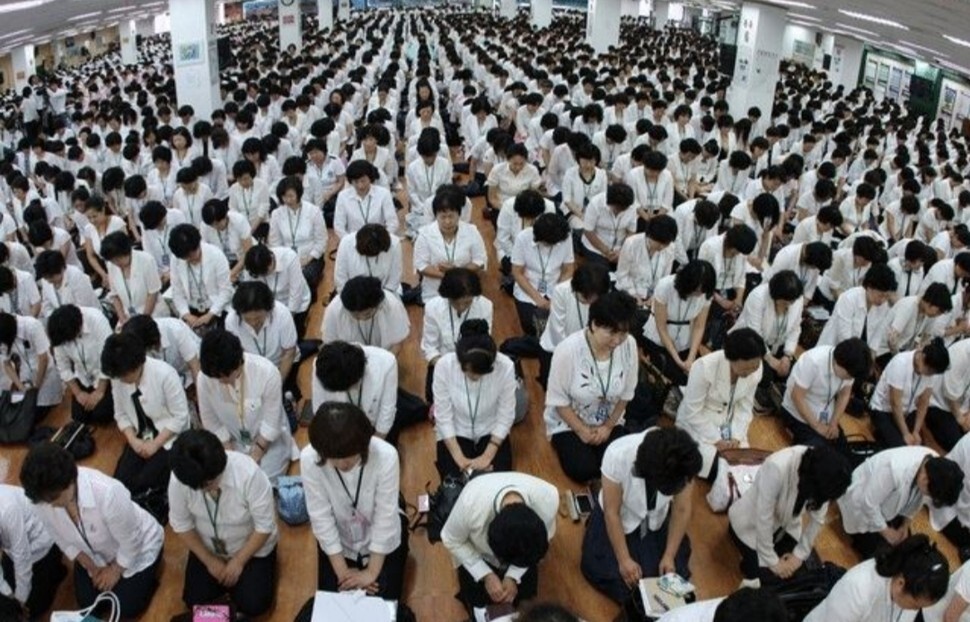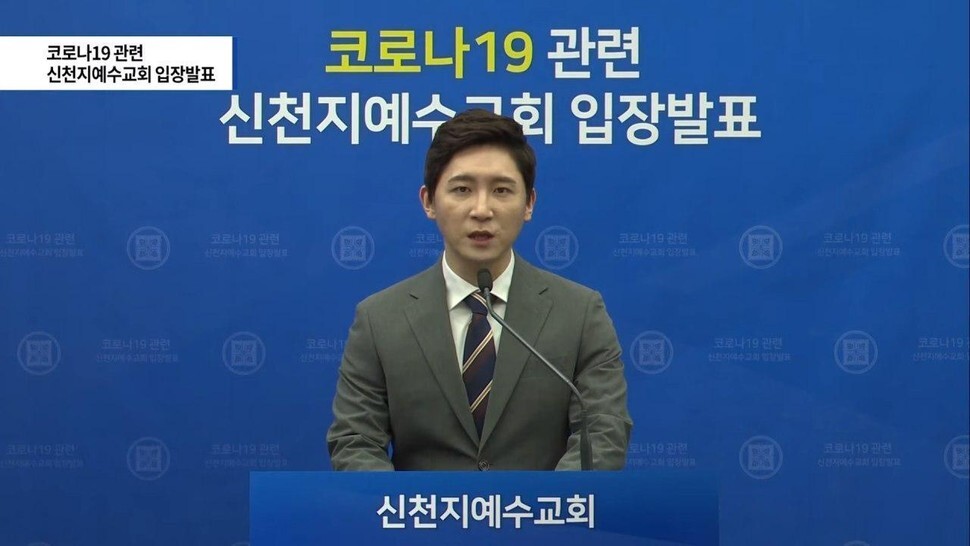hankyoreh
Links to other country sites 다른 나라 사이트 링크
[Reportage] Into the workings of the Sincheonji religious order

Tribe of Judas Thaddaeus Daegu Church, which has been identified as an epicenter for novel coronavirus transmission in Daegu, is one of 12 nationwide branches of the Shincheonji religious order, overseeing the Daegu/North Gyeongsang Province area. The name “Shincheonji” is so widely known in the religious community that scarcely anyone is unaware of it by now. It is a denomination that the Protestant community is particularly wary of. Prior to the 2000s, Protestants were most concerned about the Unification Church of Reverend Moon Sun-myung -- but since then, Shincheonji has become the chief focus of their alarm. Such is the threat they perceive from the order’s missionary efforts. For this reason, orthodox churches regard it as a heretical cult. Over the past few years, even the Catholic Church has issued warnings over Shincheonji.
The full name of the Shincheonji order is “Shincheonji Church of Jesus the Temple of the Tabernacle of the Testimony.” Members abbreviate this to “Shincheonji Church of Jesus.” “Shincheonji” is itself an abbreviation of “shincheon sinji,” meaning “new heaven and new earth,” while “tabernacle of the testimony” refers to a tabernacle for seeing, hearing, and witnessing to the truth of the Book of Revelation. Shincheonji was founded in 1984 by Lee Man-hee, now 89. Shincheonji describes Lee as the “shepherd of promise” who stands witness to the Book of Revelation, while the order is the “tabernacle of promise created as in the Bible.” The order also claims to be “the only faith in the world to share the prophecies of God and Jesus Christ hidden in the Bible and the reality in accordance with those prophecies.”
Shincheonji can only be joined after candidates undergo Bible education at the Zion Christian Mission Center, its independent Bible instruction institution, and pass a completion test. Over six months of education, students are instructed in beginning, intermediate, and advanced courses that cover everything from Genesis to the Book of Revelation. Shincheonji claims that some 103,764 people underwent instruction over a 10-month period last year, and that the “congregation includes over 300,000 people.”
Sharing its overseas missionary activities on its official website, Shincheonji mentions the establishment of a church in Wuhan, China, last year. Some observers are now questioning whether the virus has been spread by congregation members who became infected while traveling to the Wuhan church. In response, Shincheonji said that the “church in Wuhan is unable to engage in activities because it has been closed by Chinese authorities, so no congregation members have been there.”

Members of the Protestant community described Shincheonji as a “cult that regards Lee Man-hee as a savior.”
Former International Women’s Peace Group representative Kim Nam-hee, who previously served as second-in-command at Shincheonji and claims to have been in a common law marriage relationship with Lee, called him “not a savior but a sinner like me” in a YouTube video on Feb. 16. Sharing pictures as she described Lee being hospitalized and undergoing an operation, she explained, “It couldn’t get out that he was sick, so I cared for him myself and paid the hospital bills.”
In response, Shincheonji said, “We unambiguously say ‘Church of Jesus’ in our order’s name and make it clear that Jesus Christ is the Tabernacle’s leader.”
“Nobody among our congregation members refers to Lee Man-hee as a savior. That is merely somebody’s claim,” it added.
What has the Protestant community most concerned is the way in which Shincheonji goes about its evangelism. They claim that the order regards traditional and Catholic churches as “harvesting” targets, sending secret agents -- so-called “harvesters” -- to infiltrate established churches and lure in congregation members. In particular, they allege that it creates divisions by fabricating allegations of improprieties by pastors, then “gobbles up” the church once the pastor has been expelled. In response, Protestants have established a “Shincheonji heresy countermeasures committee,” and a number of churches have taken to urging caution from their congregations, posting signs at their entrances with phrases like “Shincheonji out” and “No Shincheonji admitted.”

In a statement on Feb. 21, the Korean Association of Church Communication (KOACC) said, “Shinjeonji currently has 125 disguised locations of religious activity nationwide, a number that increases to 740 if small meeting places are included.”
“In addition to a thorough investigation into all of these, there need to be comprehensive quarantine measures to prevent the disease from spreading,” the statement said.
For now, Shincheonji has announced the “complete closure of all Shincheonji-affiliated churches and associated institutions as of Feb. 18.”
“If the directions of disease prevention authorities and all matters and materials demanded by public health authorities are presented in a prompt and diligent manner, we will actively cooperate going forward,” it added.
But some observers worried that the situation could escalate unless response measures that specifically address issues related to Shincheonji are taken.
“Religious groups may become fanatical and make extreme decisions if they perceive their organization as being destabilized or their religious as being suppressed, so sophisticated measures will be needed,” said Rev. Hwang Young-ik, a former headquarters director for the Christian Ethics Movement of Korea (CEMK) minister leadership forum.

“In the case of Shincheonji, there are some 50,000 to 100,000 people who have undergone special evangelism training alone, using not only churches but free English classes and academies as bases and regarding professional soldiers as targets for evangelism,” he explained. “So there’s a difficulty in that there’s no guarantee the [virus’] spread can be prevented simply by closing the churches.”
In particular, Hwang claimed that “some of the Shincheonji ‘harvesters’ have histories of infiltrating established churches and registering there as well.”
“If they don’t attend Sunday services at the other church, they might be suspected of being Shincheonji members, so there’s the risk of a major spread of infections as they go to their other churches while infected,” he explained.
But Kim Cheol-won, a minister at Gwacheon Holiness Church and co-representative of Citizen Solidarity for Shincheonji Countermeasures in Shincheonji’s base of Gwacheon, said, “There doesn’t seem to be much likelihood that Shincheonji members have dual registration at other churches.”
Shincheonji makes public response to coronavirus worriesJang Seon-hee, director of the public relations department at Shincheonji Seoul Church, said, “While there may have been some cases of dual registration in the process of [congregation members] moving to a Shincheonji church from an old church, I don’t think there’s any possibility of people attending both churches.”
“We have closed all of our institutions, including Shincheonji churches as well as our seminary and mission centers, and have imposed a full-scale ban on evangelism and other outside activities,” Jang stressed.
In a special letter to congregation members sent by mobile phone on Feb. 21, Lee Man-hee said, “This disease is the doing of Satan, who saw how quickly Shincheonji has been growing and is now trying to stop it.”
“We are the sons of God and family of God who have grown from God’s seed, and we must overcome confusion in all of these trials,” he urged.
By Cho Hyun, religion correspondent
Please direct comments or questions to [english@hani.co.kr]

Editorial・opinion
![[Column] Park Geun-hye déjà vu in Yoon Suk-yeol [Column] Park Geun-hye déjà vu in Yoon Suk-yeol](https://flexible.img.hani.co.kr/flexible/normal/500/300/imgdb/original/2024/0424/651713945113788.jpg) [Column] Park Geun-hye déjà vu in Yoon Suk-yeol
[Column] Park Geun-hye déjà vu in Yoon Suk-yeol![[Editorial] New weight of N. Korea’s nuclear threats makes dialogue all the more urgent [Editorial] New weight of N. Korea’s nuclear threats makes dialogue all the more urgent](https://flexible.img.hani.co.kr/flexible/normal/500/300/imgdb/original/2024/0424/7317139454662664.jpg) [Editorial] New weight of N. Korea’s nuclear threats makes dialogue all the more urgent
[Editorial] New weight of N. Korea’s nuclear threats makes dialogue all the more urgent- [Guest essay] The real reason Korea’s new right wants to dub Rhee a founding father
- [Column] ‘Choson’: Is it time we start referring to N. Korea in its own terms?
- [Editorial] Japan’s rewriting of history with Korea has gone too far
- [Column] The president’s questionable capacity for dialogue
- [Column] Are chaebol firms just pizza pies for families to divvy up as they please?
- [Column] Has Korea, too, crossed the Rubicon on China?
- [Correspondent’s column] In Japan’s alliance with US, echoes of its past alliances with UK
- [Editorial] Does Yoon think the Korean public is wrong?
Most viewed articles
- 1[Column] Park Geun-hye déjà vu in Yoon Suk-yeol
- 2Will NewJeans end up collateral damage in internal feud at K-pop juggernaut Hybe?
- 3N. Korean hackers breached 10 defense contractors in South for months, police say
- 4Why Korea shouldn’t welcome Japan’s newly beefed up defense cooperation with US
- 5[Guest essay] The real reason Korea’s new right wants to dub Rhee a founding father
- 6Thursday to mark start of resignations by senior doctors amid standoff with government
- 7[Editorial] New weight of N. Korea’s nuclear threats makes dialogue all the more urgent
- 8The dream K-drama boyfriend stealing hearts and screens in Japan
- 9Kim Jong-un expressed ‘satisfaction’ with nuclear counterstrike drill directed at South
- 10Terry Anderson, AP reporter who informed world of massacre in Gwangju, dies at 76